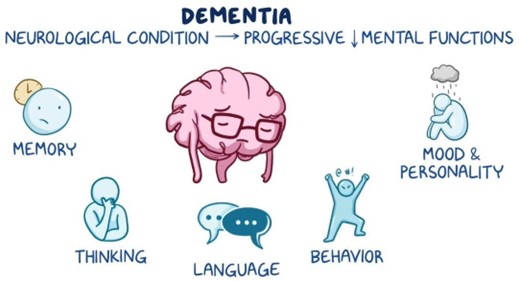A client is showing early signs of dementia. The client's spouse asks, "What may I expect next?" What is the nurse's best response?
"He may begin to try to cover recognition of his memory loss by creating events."
"He may have difficulty in a motor skill such as walking."
"The inability to communicate with speech comes immediately after the early signs."
"He may not recognize you and other people who have been in his life."
The Correct Answer is A
A. "He may begin to try to cover recognition of his memory loss by creating events." As
dementia progresses, individuals may experience confabulation, which involves creating false memories to compensate for memory loss. This is a common symptom seen in the middle stages of dementia.
B. "He may have difficulty in a motor skill such as walking." While motor skills may be affected in the later stages of dementia, it is not typically one of the early signs.
C. "The inability to communicate with speech comes immediately after the early signs." This statement is not accurate. Communication difficulties may occur in later stages, but it is not an immediate progression from early signs.
D. "He may not recognize you and other people who have been in his life." This symptom, known as agnosia, may occur in later stages of dementia, but it is not one of the early signs.

Nursing Test Bank
Naxlex Comprehensive Predictor Exams
Related Questions
Correct Answer is B
Explanation
A) Incorrect. Allowing the client to continue at his own pace may not effectively address the issue of circumstantiality and could lead to prolonged, tangential conversations.
B) Correct. Redirecting the conversation can help the client refocus and stay on topic, which can be particularly helpful for someone experiencing circumstantiality.
C) Incorrect. Stopping the client and telling him how his conversation sounds to others may be perceived as confrontational and could potentially be distressing for the client.
D) Incorrect. Reflecting is a useful communication technique, but it may not be the most effective intervention for addressing circumstantiality in this scenario.
Correct Answer is B
Explanation
A. 24 hours is a long time for alcohol withdrawal symptoms to occur.
B. Alcohol withdrawal symptoms typically begin within 6 to 8 hours after the last drink for
individuals with a history of heavy alcohol use. These symptoms can range from mild anxiety and tremors to more severe symptoms like seizures and delirium tremens. It's crucial for
healthcare providers to monitor and manage alcohol withdrawal symptoms, as they can be life- threatening in severe cases.
C. Alcohol withdrawal symptoms occur within 6 to 8 hours, not 18 hours.
D. Alcohol withdrawal symptoms occur within 6 to 8 hours, not 72 hours.
Whether you are a student looking to ace your exams or a practicing nurse seeking to enhance your expertise , our nursing education contents will empower you with the confidence and competence to make a difference in the lives of patients and become a respected leader in the healthcare field.
Visit Naxlex, invest in your future and unlock endless possibilities with our unparalleled nursing education contents today
Report Wrong Answer on the Current Question
Do you disagree with the answer? If yes, what is your expected answer? Explain.
Kindly be descriptive with the issue you are facing.
